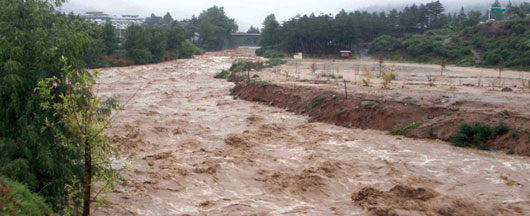‘Low ambition’ outcome at climate talks
The annual UN climate
conference has concluded with ‘’low ambition’’ both in terms of
emissions cut by developed countries and funding for developing
countries.
by Martin Khor
The UN Climate Conference in Doha ended on December 8, 2012 with the
adoption of many decisions, including those on the Kyoto Protocol’s
second period in which developed countries committed to cut their
emissions of greenhouse gases.
Many delegates left the conference quite relieved that they had
reached an agreement after days of wrangling over many issues.
The relief was that the multi-lateral climate change regime has
survived yet again but with deep differences and distrust among
developed and developing countries. The conflict in paradigms between
these two groups of countries was very evident throughout the two weeks
of the Doha negotiations, and it was only papered over superficially in
the final hours to avoid an open failure.
But the differences will resurface when negotiations resume next
year.
Avoiding collapse is a poor measure of success. In terms of progress
towards real action to tackle the climate change crisis, the Doha
conference was grossly inadequate and another lost opportunity.
 The conference was held at the end of a year of record extreme
events. News of typhoon in the Philippines, which killed 500 and made
300,000 homeless, reminded conference participants of the reality of the
climate crisis. The conference was held at the end of a year of record extreme
events. News of typhoon in the Philippines, which killed 500 and made
300,000 homeless, reminded conference participants of the reality of the
climate crisis.
However, the dictates of economic competition and commercial
interests, unfortunately, were of higher priority, especially among
developed countries, thus their low ambition in emissions reduction.
They also broke their promises to provide funds and transfer technology
to developing countries.
Adoption
The most important result in Doha was the formal adoption of the
Kyoto Protocol’s second period (2013 to 2020) to follow immediately
after the first period expires on December 31.
However, the elements are weak. With original members Canada, Russia,
Japan and New Zealand having decided to leave the Kyoto Protocol or not
join for a second period, only Europe, Australia and a few others
(totalling 35 developed and transitioning countries) are left to make
legally binding commitments in the second period. Also, the emissions
cuts these countries have agreed to commit to are in aggregate only 18
percent by 2020, below the 1990 level, as compared to the 25-40 percent
required to restrict global temperature rises to two degrees Celsius.
A saving factor in the Kyoto Protocol decision is the “ambition
mechanism” put in by developing countries, that the countries will
“revisit” their original target and increase their commitments by 2014,
in line with the aggregate 25-40 percent goal.
Also, the decision severely limited the credits or surplus allowances
available for the second period. These had been accumulated in the Kyoto
Protocol’s first period by countries that had cut their emissions by
more than the targeted level.
According to the decision, these countries may not use or trade most
of the surplus allowances as a means of avoiding the current emissions
cuts.
The most important country affected is Russia, which strongly
objected to the way conference president Abdullah Hamad al-Attiyah of
Qatar bulldozed through the KP decision even though it and two other
countries disagreed.
A second major criticism of the Doha decisions is the lack of funds
to be provided to developing countries for climate action. The 2010
conference in Cancun decided that developed countries would mobilise
climate finance of $100bil a year from 2020, and that $30bil of
fast-track finance would be given in 2010-2012. But there is a gap
between 2013 and 2020. Despite the demand by developing countries that
there be $60bil by 2015, Saturday’s decision does not specify any number
as a commitment, only “encouraging” countries to provide at least as
much as they had in the 2010-2012 period.
The lack of a credible financial commitment curtails the developing
countries’ ability to undertake actions to combat climate change, and
led to their protest on the plenary floor.
Paragraphs
The Doha conference also adopted a set of decisions on long-term
action. Developing countries were pleased with paragraphs on equity,
unilateral trade measures, technology assessment and a vague reference
to the effects of intellectual property.
However, these decisions were very weak. Even so, the United States
registered disagreement or reservations on these decisions after
adoption of the text, indicating how they may continue to object in
future discussions.
– Third World Network Features
|



